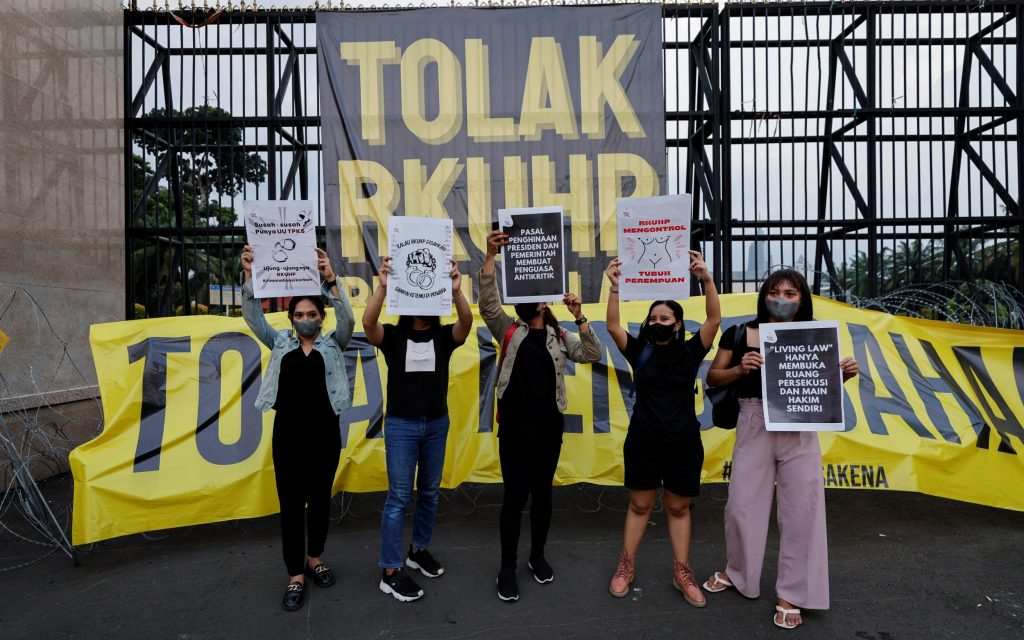A new criminal code that curbs political liberties and outlaws extramarital sex has been approved by Indonesia’s parliament.
According to the new legislation, which go into force in three years, having sex outside of marriage might result in a jail sentence of up to a year.
The numerous adjustments follow a growth in religious conservatism in the nation with a majority of Muslims.
The laws are criticised as a “disaster” for human rights and as a possible hindrance to travel and investment.
This week, a number of mostly young people’s groups demonstrated against the legislation in front of the Jakarta parliament. It is anticipated that the new laws will face legal challenges.
Both residents and foreigners living in Indonesia or travelling to vacation spots like Bali must abide by them. Unmarried couples who are caught having sex may face up to a year in jail, according to the law.
They are also forbidden from cohabitating, a crime punishable by up to six months in jail. Adultery is a crime for which people are subject to incarceration.

Prior to the adoption of this new criminal code, having sex before being married was already prohibited, although the rule was frequently not upheld.
The new rule forbids any extramarital sex, including that which occurs between unmarried couples. The previous law defined adultery as sexual activity between a married man and a woman who was not his wife. Additionally, the sentence for those who are caught has been lengthened from nine months to a year.
In order for charges to begin, a complaint must be made by the accused couple’s children, parents, or spouse, according to supporters of the new legislation.
Ajeng, a 28-year-old Muslim woman living in the West Java city of Depok, said she was now at risk for living with her partner for the past five years.
“With the new law, both of us can go to jail if one of the family decides to make a police report,” she told the BBC.
“What if there’s one family member who has a problem with me and decides to send me to jail?
“I think living together or having sex outside of marriage is not a crime. In my religion, it’s considered a sin. But I don’t think the criminal code should be based on a certain religion.”
She said she had joined the nationwide protests in 2019 when the law had first been broached. She took the sign: “For the right to cuddle, I took to the streets.”
However on Tuesday, parliament unanimously approved the new code of over 600 articles.

Many businesses had also been opposed to the legislation, saying it discouraged visitors and investment. But lawmakers have celebrated overhauling laws dating back to Dutch colonial rule.
“It is time for us to make a historical decision on the penal code amendment and to leave the colonial criminal code we inherited behind,” law minister Yasonna Laoly told parliament.
Numerous new provisions in the new legislation criminalise immorality and blasphemy while limiting freedom of speech in politics and religion.
Elaine Pearson, the director of Human Rights Watch in Asia, told the BBC that it was a “major setback for a country that has tried to depict itself as a modern Muslim democracy.”

According to Andreas Harsano, a researcher for the group located in Jakarta, millions of Indonesian couples do not have marriage licences, “particularly among Indigenous peoples or Muslims in rural regions” who got hitched in particular religious rituals.
Numerous new provisions in the new legislation criminalise immorality and blasphemy while limiting freedom of speech in politics and religion.
Elaine Pearson, the director of Human Rights Watch in Asia, told the BBC that it was a “major setback for a country that has tried to depict itself as a modern Muslim democracy.”
According to Andreas Harsano, a researcher for the group located in Jakarta, millions of Indonesian couples do not have marriage licences, “particularly among Indigenous peoples or Muslims in rural regions” who got hitched in particular religious rituals.















